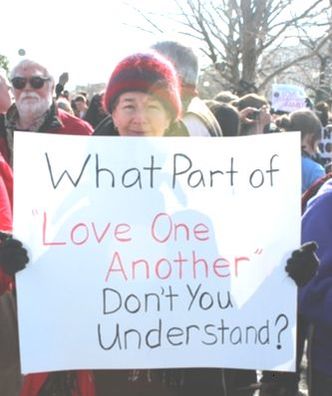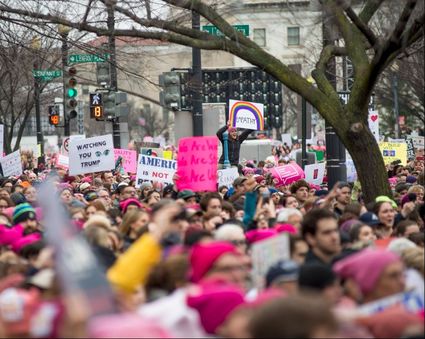|
On Facebook someone recently encouraged me to pray. This encouragement was in response to one of my many enraged posts about a policy change that would affect the poor. Pray? Did you say PRAY!? The comment sent me into orbit. Full disclosure: anything can send me into orbit these days. Like many progressive Christians, I am enraged by the current administration's rhetoric about the other, be they poor, Muslim, minorities, transgendered, et al. While commuting in my trusted mini van, angry rebuttals are shouted as I listen to NPR-- as if the commentator can hear me on the other side of the radio. Spiritually centered? Nope. Not these days. Concerned deeply for justice? Got that covered. Let us return to prayer before I digress into a debate about health care reform. After I calmed down, just a little, I wondered why this well meaning person’s post suggesting I pray made me so angry. Could it be that I found prayer anemic in the face of millions of Americans losing their health care? Martin Luther King Jr reminded his white colleagues, who often encouraged patience and prayer, that he took prayer too seriously to use it as an excuse for avoiding responsibility. Prayer is not going to ensure that millions of Americans keep access to health care. It occurred to me in that moment that prayer is a tool, not an objective. As one who follows Jesus, my ultimate objective is not for a more prayerful world, but a more just and equitable world. Prayer, along with activism and community organizing, are tools Christians are called to employ to seek the kingdom of God here on Earth.  My Facebook friend was not wrong to suggest I pray. I admire great Christian activists, like Dorothy Day, who were committed to daily prayer. Too often, however, prayer is mistaken as the only Christian resource, or worse, the end goal of spiritual life. The American evangelical movement has been overly concerned with personal piety. As long as someone has a prayer life, it doesn’t seem to matter, for example, if they pay their employees a living wage. (The Walton Family, owners of Walmart, are a case in point.) Just a perusal of a Christian book store will confirm this: so many books on prayer, so few on justice. This singular attention to prayer misrepresents Jesus’ ministry. Jesus’ ministry--his very work-- was to turn the social order upside down. He sought justice for the poor, healing for the sick, protection for the most vulnerable, and inclusion for the excluded. He prayed in private more than in public. Mostly he stirred the pot. His sermons were like protest marches, his healing subversive. At his first public appearance in his hometown synagogue (Luke 4) he reads from the prophet Isaiah: [God] has sent me to bring good news to the oppressed, to bind up the brokenhearted, to proclaim liberty to the captives, and release to the prisoners. (Isaiah 61:1) In this moment, Jesus makes clear the objectives of his ministry. His “stump speech” makes no mention of prayer; it’s all about hope, and mercy, and liberation. Personal piety was not a prerequisite for Jesus’ disciples, or for Jesus. More often than not, Jesus prayed alone, away from the crowds, for the courage and energy to continue. In this way, Jesus used prayer as a tool. In a rare moment when Jesus speaks of prayer, he describes it as a private affair: “And whenever you pray, do not be like the hypocrites; for they love to stand and pray in the synagogues and at the street corners, so that they may be seen by others . . . But whenever you pray, go into your room and shut the door and pray to your Father who is in secret.” (Matthew 6:5-6). Jesus never admonishes his followers to pray without ceasing. Paul does, not Jesus.
Activism--phone calls, protesting, marching, writing letters, meeting with legislators, voting--and prayer, but not prayer alone-- will help ensure that an elderly person in Iowa has the medication they need and that a young mother in Texas can take her feverish newborn to the hospital. As one who follows Jesus, my goal is the kingdom-- a kingdom in which all people have health care, not just those who can afford it. Prayer is a tool for achieving God’s kingdom. Jesus sought after this kingdom, working hard to to create it, and he prayed along the way, but he did much more. So shall we
0 Comments
 My year began on January 21st when I gathered with over 500,000 citizens (well 500 thousand plus if you embrace facts opposed to alternative facts) in Washington, DC. I stood beside my 13 year old and 10 year old boys and a dozen other members of my faith community. We listened, cheered, held up signs, waited in line for the port-a-potties, marched, laughed, and cried. Since that day I have been trying to process what I learned, what it felt like to be in a moment of history with my two beloved boys, and just what this movement means now and for the future of our country. This will not shock you if you have read any of my previous blogs: I am a progressive Christian feminist. What has happened since since Donald Trump moved into the West Wing is very concerning to me. But I am not a policy wonk or political organizer. I am a pastor, a mother of two boys and a girl, a woman, a feminist, a community leader. I haven’t had anything to add to the conversation until I preached this Sunday. Long before I headed to DC, I planned my Jan-February preaching schedule. I decided before Lent began that it would be a good idea (yes my thinking was no deeper than “this seems like a good idea”) to spend time in the Hebrew Scriptures. I like Exodus. I chose my scriptures. The first Sunday we would start at the very beginning, Exodus 1, with the midwives. Sounded like a “good plan.” I then went to DC. When I returned the story found in Exodus 1 took on new meaning. I discovered it was a story not just of faith, but of resistance. The beginning of Exodus, chapters 1 & 2, is about a group of women who cooperate, communicate, and work together across social divides to thwart a genocide. Central to this resistance movement are two midwives who, like Rosa Parks, spark the wider resistance. Their names have been forgotten as Sunday school classes learn of Moses and Aaron and their violent successor Joshua, but never of Shiphrah and Puah. We know very little about the midwives Shiphrah and Puah. But they must have enjoyed a certain level of privilege and power to be meeting with Pharaoh face to face. We can only assume they were well respected, so well respected that the Pharaoh needed them on his side. The Pharaoh orders them to kill, with their very own experienced hands, every Hebrew boy they usher into the world. They resist, knowing full well that resistance in Pharaoh's land can only mean death. Learning of their refusal, the enraged Pharaoh calls them back, wondering what has happened, “Why aren’t you killing the Hebrew babies!?” he demands. Their response traps the Pharaoh in his own ignorance and prejudice. Capitalizing on his conviction that the Hebrew people are less than human, they explain that the Hebrew women are not like Egyptian women, “they are vigorous and give birth before the midwife comes to them.” (Exodus 1:19) The word translated vigorous has a possible second meaning in Hebrew--animal like. The Pharaoh thinks that Jews are animal like. But the two midwives know better--perhaps they know that we are all human? Certainly, they know race and class have no bearing on how long women labor. So they refuse to side with the Pharaoh and refuse to accept the Empire’s “truth”. Their subversion exposes the Pharaoh’s plan and his malevolence. Soon many women become involved, including Moses’ mother and sister, and Pharaoh's daughter. Together, these women save the children. There are many things about the midwives’ story that are radically different than mine.They acted in secret; my demonstration was public. They endangered their lives; I was protected by the US Constitution and a large police presence. And I’m not nearly as famous or influential as they were. The Pharaoh met with them, but Trump won’t meet with me! (And I think we’re better off that way.) Yet I do have a few things in common with the midwives. First, as a pastor, I find myself aligned with the work of a midwife, as one who welcomes life. Much of my work is about protecting, nurturing, and celebrating life in all of its varied forms, whether that life be a transgender youth, a Muslim refugee, a homeless veteran, a hungry family, or a spiritually abused adult. Second, like the midwives, I enjoy a certain level of protective privilege. The midwives lives were never endangered; Pharaoh wasn’t after their own offspring. As a well educated straight white woman living in Massachusetts with great health care, I’m fine. Yet like the midwives, I believe that people of privilege can be a part of God’s liberating work, that we must be a part of the resistance. Finally like the midwives, I am a woman of faith. In just the few short verses in which we learn of the midwives’ stories we are told twice that they “fear God.” Although the phrase “fear God” echos uncomfortably in our modern ears, it describes someone who respected God and God’s ways. I marched in Washington because I am a feminist, because I value progressive social policies, because I am rearing a girl, but mostly I marched because as a Christian I have been called to honor God’s ways. God values life-- all life. God values the life of newborn Hebrews and crotchety old Egyptians. God values the life of Mexican immigrants and angry American nativists. God values the life of women making difficult choices about their future. She values the life of LGBTQ+ folks, straights, Muslims, Christians, refugees, and everyone who lacks power. In Shiphrah and Puah we encounter ordinary women who act courageously to defy authority, to do what they believe to be right. Their story is but one of many accounts in the Hebrew Bible of people whose faith confronted the intimidating power of oppressive authority. Let us, as people of faith, not grow complacent. Let us as people of faith, especially if we are in positions of privilege, resist. Let our courage speak louder than the fearmongering lies that power foists on us today. |
Categories |
 RSS Feed
RSS Feed